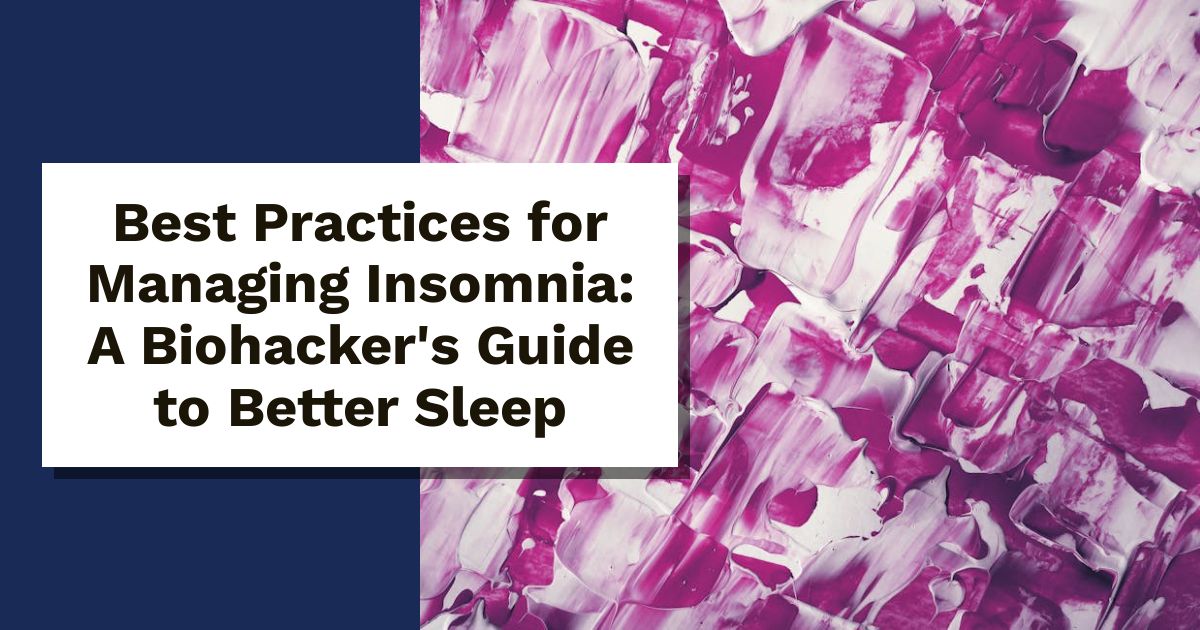Insomnia is everywhere these days. If you’ve ever tossed and turned all night, you know how draining it can be. A restless mind can lead to fatigue, focus issues, and even mood swings. That’s why managing sleep effectively is essential.
In this guide, you’ll find practical tips and techniques geared toward biohackers who want to optimize their sleep. From sleep routines to environmental tweaks, we’re covering what works.
Are you ready to upgrade your Zzz’s and reclaim your nights? Let’s dive in and discover how to battle insomnia together.
Understanding Insomnia
Insomnia is more than just a sleepless night; it’s a serious condition affecting countless people. Simply put, insomnia is the inability to fall or stay asleep, leading to fatigue and other problems during the day. This issue can disrupt your life significantly, impacting your mood and overall well-being. Understanding what insomnia is and why it happens can help you manage it better.
What is Insomnia?
Insomnia is characterized by difficulties falling asleep, staying asleep, or waking up too early. When persistent, it can lead to a chronic state of exhaustion. If you’re curious about the specifics, Cleveland Clinic offers an in-depth explanation of this common sleep disorder.
Types of Insomnia
Insomnia isn’t a one-size-fits-all issue; it comes in different flavors. The two main types are:
- Acute Insomnia: This short-term issue lasts from a few days to a few weeks. It often occurs in response to life stressors, like job changes or relationship problems.
- Chronic Insomnia: When sleeplessness occurs three times a week for three months or longer, it’s considered chronic. This can stem from ongoing stress, anxiety, or underlying health conditions. For more information, see the resources from Sleep Foundation.
Causes of Insomnia
Many factors can trigger insomnia. Understanding these can help you pinpoint your problem areas. Here are some common culprits:
- Stress: Worries about work, relationships, or health can keep your mind racing at bedtime.
- Lifestyle Choices: Irregular sleep schedules, excessive screen time, or high caffeine intake can disrupt your natural sleep patterns.
- Medical Issues: Conditions like arthritis, asthma, or mental health disorders often contribute to sleep difficulty.
For a comprehensive look at the causes of insomnia, check out the Mayo Clinic. By identifying triggers, you can take proactive steps to address your insomnia.
Biohacking Basics for Sleep
Getting quality sleep can be a game-changer for managing insomnia. By focusing on your sleep environment, routine, and room temperature, you’ll create the perfect recipe for better rest. Let’s explore these areas!
Setting Your Sleep Environment
Creating a cozy and dark sleep space is essential for achieving restful sleep. Follow these tips to transform your bedroom into a sleep sanctuary:
- Invest in Quality Bedding: Soft, breathable sheets make a world of difference. They keep you comfortable all night long.
- Embrace Darkness: Darkness signals your brain that it’s time to sleep. Consider blackout curtains or an eye mask to block out light.
- Ban Tech from the Bedroom: Keep screens out. They emit blue light that can interfere with your sleep cycle.
- Add Calming Scents: Aromatherapy can set the mood. Scents like lavender and chamomile help you unwind. Naturally Stellar offers more tips on creating a serene atmosphere.
Routine is Key
Consistency is crucial for sleep health. A regular sleep schedule helps regulate your body’s internal clock. Here’s why sticking to a routine plays a vital role:
- Establish a Sleep Schedule: Go to bed and wake up at the same time every day. This reinforces your body’s natural sleep-wake cycle.
- Limit Naps: If you need to nap, keep it short—around 20 minutes. Longer naps can disrupt your nighttime sleep.
- Wind Down Before Bed: Engage in a relaxing pre-sleep routine. Activities like reading or stretching can signal to your body that it’s time to sleep.
- Consider Your Circadian Rhythm: Your body thrives on consistency. For a deeper dive into how a sleep schedule can change your life, check out Sleep.com.
Temperature Matters
Your bedroom temperature significantly impacts the quality of your sleep. So, what’s the ideal room temperature?
- Aim for Cool: Research suggests keeping your bedroom between 60°F to 67°F (15°C to 19°C) is usually best for sleep. This range allows your body to lower its core temperature, signaling that it’s time to sleep.
- Use Bedding Wisely: Choose comforters and sheets designed for breathability. Layering can help you adjust to temperature changes throughout the night.
- Check Your Thermostat: Ensure it’s set to your comfort level before hitting the hay. For more on the best sleep temperature, see Cleveland Clinic.
By optimizing your sleep environment, maintaining a consistent routine, and controlling your room temperature, you can significantly enhance your sleep quality and effectively manage insomnia.
Diet and Supplements
Your diet plays a significant role in your sleep quality. What you eat and when you eat it can profoundly impact your ability to fall and stay asleep. Here, we’ll uncover foods to avoid before bed, highlight sleep-friendly options, and look at natural supplements that can assist with insomnia.
Foods to Avoid Before Bed
Certain foods and beverages can sabotage a good night’s sleep. Here’s a list of items known to disrupt sleep and should be avoided in the hours leading up to bedtime:
- Caffeine: Found in coffee, tea, and chocolate, caffeine is a stimulant that can keep you awake.
- Alcohol: While it may initially make you sleepy, alcohol can disrupt your sleep cycle later in the night.
- Spicy Foods: These can cause heartburn and discomfort, making it harder to sleep.
- High-Fat Foods: Greasy meals can take longer to digest, leading to discomfort during the night.
- Sugary Snacks: Foods high in sugar can cause energy spikes, leaving you wide awake.
- Dairy Products: For some, dairy may result in digestive issues, impacting sleep quality.
- Acidic Foods: Citrus fruits and tomatoes can cause acid reflux, which may disrupt sleep.
For more detailed insights, check out Top Ten Foods to Avoid for a Good Night’s Sleep and 9 Foods to Avoid Before Bed.
Sleep-Friendly Foods
On the flip side, some foods can actually promote sleep. Consider incorporating these into your evening meals:
- Almonds: Packed with magnesium, almonds can help regulate sleep.
- Kiwi: This fruit is loaded with antioxidants and serotonin, aiding sleep onset.
- Fatty Fish: Salmon and mackerel are great sources of omega-3 fatty acids, which promote better sleep.
- Oatmeal: Rich in melatonin, oatmeal is a comforting choice to wind down.
- Chamomile Tea: Known for its calming properties, chamomile can help relax your mind before bed.
For more on foods that enhance sleep, check out The 9 Best Foods and Drinks to Have Before Bed and The Best Foods To Help You Sleep.
Natural Supplements
When diet alone isn’t enough, natural supplements may offer a boost for better sleep. Here are some worth considering:
- Melatonin: Often referred to as the sleep hormone, melatonin can help regulate your sleep-wake cycle. Taking a supplement can assist if your body doesn’t produce enough on its own.
- Magnesium: This mineral has a calming effect on the nervous system and can improve sleep quality.
- Valerian Root: Valerian may reduce the time it takes to fall asleep and enhance sleep quality.
- L-Theanine: Found in tea, this amino acid promotes relaxation without sedation.
Interested in learning more? Check out 10 of the Best Natural Sleep Aids in 2024 and Natural Sleep Aids: Which Are the Most Effective?.
Incorporating the right foods and supplements can be a powerful strategy for managing insomnia. Eating consciously and choosing supplements wisely may lead to improved sleep quality and a more rested you.
Mindfulness and Relaxation Techniques
Incorporating mindfulness and relaxation techniques into your bedtime routine can be a game-changer for those seeking better sleep. These practices not only help calm the mind but also prepare your body for a restful night. Let’s explore three key techniques: meditation, breath work, and gentle yoga stretches.
Meditation Practices
Meditation is an effective way to quiet your mind and prepare for sleep. Here are some simple methods you can try:
- Body Scan Meditation: Lie down comfortably and mentally scan your body from head to toe. Notice any tension and consciously relax those areas.
- Breath-Focused Meditation: Concentrate on your breath, inhaling deeply and exhaling slowly. This can help center your thoughts and ease anxiety.
- Visualization: Picture a calming scene, such as a beach or forest, and immerse yourself in the soothing details.
Start with just a few minutes each night and gradually increase your practice time. For more guidance on meditation for sleep, visit Sleep Foundation and Calm.
Breath Work
Breath work techniques are powerful tools for relaxation, helping to reduce stress and anxiety. Here are a few exercises to enhance your wind-down process:
- Box Breathing: Inhale for a count of four, hold for four, exhale for four, and pause for four. Repeat this cycle several times.
- Abdominal Breathing: Lie on your back and focus on breathing deeply into your abdomen rather than your chest. This method promotes relaxation and oxygenates your body effectively.
- 4-7-8 Breathing: Inhale for four seconds, hold for seven seconds, and exhale for eight seconds. This technique can help calm the nervous system.
For detailed instructions on breath work, check out Healthline and WebMD.
Gentle Yoga Stretches
Gentle yoga can help relieve tension and prepare your body for sleep. Consider adding these stretches to your pre-sleep routine:
- Child’s Pose: Kneel and sit back on your heels, extending your arms forward on the ground. This pose calms the mind and stretches the back.
- Legs Up the Wall: Lie on your back and extend your legs up against a wall. This position encourages blood flow and relaxation.
- Seated Forward Fold: Sit with your legs extended and gently bend forward. Breathe deeply and feel the stretch in your back and hamstrings.
These postures can help soothe your mind and body as the day winds down. For more yoga suggestions, explore Calm and Mindful.
Incorporating these mindfulness and relaxation techniques can significantly enhance your sleep quality. Give them a try and see how they impact your nightly routine!
Technology and Sleep Management
Managing your sleep effectively often involves harnessing technology to enhance your rest. From mitigating screen time before bed to utilizing sleep tracking apps, technology can play a crucial role in improving sleep quality. Let’s break down some smart strategies.
Screen Time Tips
Limiting screen time before bed is essential for a good night’s sleep. The blue light emitted by devices can confuse your brain, tricking it into thinking it’s still daytime. Here are some tips to reduce screen time effectively:
- Set a Cutoff Time: Aim to turn off screens at least 30 minutes to 1 hour before bed. Establishing a bedtime for your devices can enhance your wind-down routine.
- Create Tech-Free Zones: Make your bedroom a sanctuary. No phones, tablets, or laptops should be allowed in your sleep space. This separation promotes better sleep quality.
- Engage in Alternative Activities: Instead of scrolling through social media or binge-watching shows, consider reading a book, listening to calming music, or practicing relaxation techniques. For more ideas, check out 8 Ways Reducing Screen Time Can Lead to Better Sleep.
Apps for Sleep Tracking
Sleep tracking apps can help you monitor your sleep patterns and gain insights into your habits. They offer valuable data that can assist in formulating tailored strategies for improvement. Here are some worthy apps to consider:
- Sleep Cycle: This app analyzes your sleep patterns and wakes you up during your lightest sleep phase, making mornings easier.
- Pillow: A user-friendly option that tracks sleep and offers personalized insights based on your data.
- Calm: More than just a sleep tracker, it also provides meditation resources to help soothe your mind before bed. For more information, visit The Best Sleep-Tracking App.
- Sleep as Android: This app tracks your sleep cycles and includes features like snore detection and smart alarms.
Blue Light Glasses
Wearing blue light glasses could enhance your sleep quality by filtering out harmful blue light. Blue light exposure can interfere with melatonin production, making it harder to fall asleep. Here’s how blue light glasses can help:
- Regulate Your Sleep-Wake Cycle: By blocking blue light, these glasses support a healthier circadian rhythm, allowing you to rest better.
- Reduce Eye Strain: Prolonged screen exposure can lead to eye discomfort. Blue light glasses can alleviate this strain, making screen time more comfortable. Learn more about their benefits at What Are the Benefits of Blue Light Glasses?.
- Improve Sleep Quality: Consistent use of these glasses can lead to better sleep patterns, as they help your body recognize when it’s time to wind down.
By making smart adjustments with technology, you can take significant strides in managing your insomnia and achieving better sleep.
Seeking Professional Help
When sleepless nights become a routine, it might be time to consider professional help. Identifying when you need a doctor or therapist can make a real difference. Don’t hesitate to take this important step toward better sleep.
When to See a Doctor
Recognizing the signs that indicate a need for professional help is crucial. Here are some key indicators that signal it’s time to see a doctor:
- Chronic Sleep Disturbance: If sleep problems last longer than a month, it’s time to get help. Persistent insomnia can affect your daily life and overall health. For more information about timelines and other concerns, check the Healthline article.
- Daytime Fatigue: If you’re experiencing ongoing fatigue despite a full night’s sleep, consult a professional. This might indicate your sleep quality isn’t where it should be. NHS discusses when to seek help for insomnia.
- Impact on Daily Life: If insomnia affects work, relationships, and other aspects of your life, it’s time to talk to your doctor. Duke Health provides insight into when to visit a sleep specialist.
- Mood Changes: Increased irritability, anxiety, or depression due to lack of sleep should not be overlooked. These changes can signal an underlying problem that needs addressing.
What to Expect in Therapy
If you decide to seek therapy, knowing what to expect can ease your mind. The most recognized approach is Cognitive Behavioral Therapy for Insomnia (CBT-I). Here’s a quick overview of what this typically involves:
- Assessment: Initial sessions often include an assessment of your sleep patterns and behaviors. Your therapist will gather information to understand your unique situation. The Mayo Clinic offers a detailed overview of this process here.
- Behavioral Changes: CBT-I focuses on developing healthy sleep habits. You’ll learn strategies to improve your sleeping environment and routines, making rest easier. Good Health Psych explains how these changes work.
- Sleep Education: You’ll gain insights into the science of sleep and how your thoughts and beliefs may affect it. Understanding your sleep cycle can empower you to change negative patterns.
- Relaxation Techniques: Techniques like mindfulness and relaxation exercises are often included to help manage anxiety around sleep. For additional reading on CBT-I, visit Stanford Healthcare.
Seeking professional help is a proactive step in managing insomnia. By recognizing the signs and knowing what to expect, you can make informed decisions that lead to restful nights and brighter days.
Conclusion
Managing insomnia requires a blend of practical strategies and a splash of creativity. You’ve learned how crucial a good environment, consistent routines, and mindful habits are for achieving restful sleep. Experiment with the techniques highlighted, from adjusting your diet to integrating relaxation practices.
Don’t hesitate to explore different approaches to find what suits you best. Remember, improving your sleep is a journey, and every small change can have a big impact.
As you pursue better sleep, think about how these insights may shape your overall well-being. Your path to peaceful nights and energized days awaits!
Brooke is a rock-climbing 🧗♀️, tennis-playing 🎾, biohacking 🧬 bookworm 📚 on a mission to unlock the secrets of health, longevity, and living life to the fullest 🌟. When she’s not scaling cliffs, hitting the courts, or testing out the latest hacks, you’ll find her nose in a book or adventuring with her four-legged best friend 🐕 by her side. With a knack for turning science into simple, actionable tips, Brooke’s writing is your guide to hacking your biology and living your best, most vibrant life!


